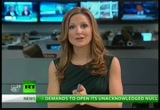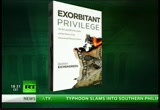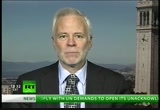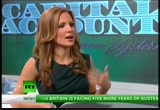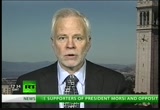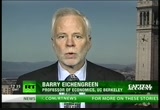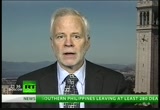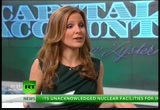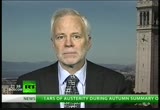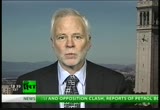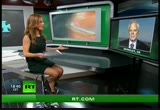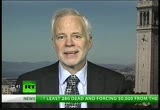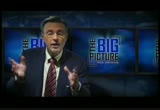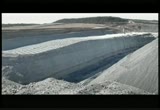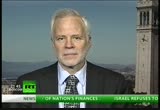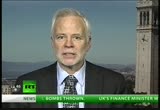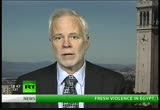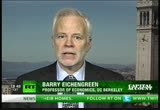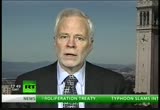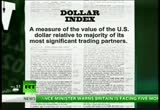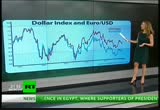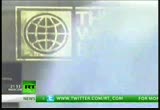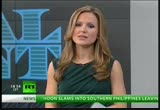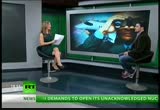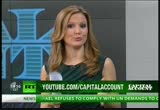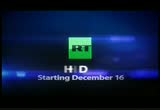tv [untitled] December 5, 2012 12:30pm-1:00pm EST
12:30 pm
so reverberates around the global echo chamber providing the baseline for headlines like this that we found a day in the english edition of the chinese government news source no deal in sight on the u.s. fiscal cliff to the international edition of the german paper der spiegel budget disarray u.s. set to restage greek tragedy now it may not represent the same type of threat but it is reminiscent of the debt ceiling debate in the summer of two thousand and eleven after which the u.s. of course lost its aaa credit rating from s. and p. for the first time in history now the ratings agency then said washington's deal on the debt ceiling didn't go far enough to address america's deteriorating finances nonetheless the u.s. has continued to enjoy its exorbitant privilege despite the downgrade despite the debt that the that the government has been racking up that exorbitant privilege of course is the issue is issuing the global reserve currency the u.s. dollar and despite the downgrade and more fed money printing the dollar has held up
12:31 pm
relative to other currencies this is given rise to endless metaphors the cleanest dirty shirt the best horse at the glue factory you name it all in the global context of the eurozone crisis and concerns about a hard landing in china and now someone who has made a career out of examining monetary history is here to help us make sense of this is barry eichengreen professor of economics at u.c. berkeley and author of this book exorbitant privilege the rise and fall of the dollar and the future of the international monetary system so professor i can green thanks so much for being on the show so happy to have you. could be here it's great to have you so let's start with this focus on the fiscal cliff because as i said you know sitting here in washington it's very much framed as a domestic debate but it is reverberate around the world you know people across the world read these headlines so for other countries sitting on reserves of u.s. dollar depending on the u.s. the solver and face to back the global monetary system what is the perception. well
12:32 pm
foreign central banks and governments clearly are watching closely but i think everybody needs to grow a distinction between what might happen on january first to the dollar and what could happen in the longer run i remind you that when we have the debt ceiling imbroglio in august of two thousand and eleven the dollar actually strengthened when lehman brothers failed in september two thousand and eight the dollar actually strengthened its safe haven currency and when there is a crisis even if we cause that are sold in the united states there tends to be flying toward the dollar rather than away and that could happen again at the beginning of next year if indeed we go off the fiscal cliff in the longer run. all that it's chaos surrounding u.s. fiscal policy and questions about whether we can get our house in order. that's not
12:33 pm
going to be good for the dollar. looking out over a longer period i do think feeling. aggressor fiscal problems would be dollar negative ok so then let's talk more about this because we could add to what you point out is the strengthening of the u.s. dollar after these events that you would imagine would negatively impact it add to that that we've seen three years of quantitative easing and we haven't seen a dollar collapse there the dollar crisis that some predicted when they were seeing the fed issue all of this new currency and expand the monetary base inflation concerns remain low the concerns about a dollar collapse are sedated is this a false sense of security and you kind of said yes that longer term this could be an issue so then i want to know what the concern is i know you've seen you write about about china preparing the red mindi to act as a reserve currency. well the concern is number one that the u.s. it's not going to remain twenty five percent of the global economy what do. it is
12:34 pm
now forever merging markets will continue to emerge will continue to grow faster than the us the us government is not going to be able to pump out safe and liquid assets on the scale that the global economy requires so there will have to be other sources of those assets in my book a year and a half ago i said the eurozone and china are the most likely alternatives but they're both having problems at the moment so there really is no alternative to the dollar that's one factor supporting the currency and the other fundamental is the liquidity of u.s. financial markets the u.s. treasury bond market is the single largest and most liquid financial market in the world and that's important in times of turbulence that's what continues to make the dollar and only the dollar crude safehaven currency so
12:35 pm
then even if there were because you're saying that you're on the right maybe they're not qualified even if they were do you see a scenario where you would ever be confident that central banks could have an orderly transition to another fear based monetary order where another currency was the reserve currency. i do think that's possible i do think that central banks and private investors could adapt themselves to a world where there were three true global currencies the dollar the euro and the renminbi where there were deep and liquid markets in all of them and where all of them were used in international credit sections i think indeed that could make the world a safer financial place because if one of the issuers say the u.s. government. misbehaves doesn't follow prudent policies there would be alternatives that were moving away from the dollar wouldn't mean. global liquidity shortage if
12:36 pm
there were alternative sources of liquidity in europe and china that's interesting do you see this stage being set where that could be a reality. in my book i did see that possibility and i. forecast that ten years from now we could be in a world where the euro and the renminbi were serious competitors to the dollar i become a little more pessimistic be because as everyone knows the eurozone has not been able to grow a line under its crisis the euro has been losing ground in the last year or so as a reserve currency and the chinese have problems since well but with their growth slowing down it's important to note that all the important reserve currencies in history have been the currency so political democracies where investors are confident that
12:37 pm
there are limits on the arbitrary power of the executive and one has to wonder whether china's political system may be the obstacle to the renminbi becoming the crude global currency ok and we set up now what an orderly transition would look like a situation where the dollar was not so dominant what a disorderly one what do you think what i just imagined what a disorderly scenario would be and what do you think would happen would there be more of a role for private currencies would people flee to commodity when you pick well i think if there was a crisis of confidence in the dollar and there hadn't been time for alternatives alternative currencies to emerge. investors would flee and second tier currencies the swiss franc the norwegian krone canadian dollar the problem being that there are not enough swiss francs and canadian dollars to go around they would
12:38 pm
flee. into commodities gold first and foremost but. gold doesn't really have the liquidity that importers an exporter and financial market participants require so even though there would be flight and second tier currencies and commodities i think we'd be facing a global liquidity shortage and twenty first century globalization really would be at risk you know i want to ask more about this i know that your new think that there were charges that kind of a gold standard is ridiculous i want to know why is that we did get away i mean isn't there something ridiculous pout a debt based money system too. i hope always think of winston churchill in what he said about democracy the worst possible system except for the alternatives i think the same is true of money systems we have been moving away from them gradually we've been moving away from commodity money systems
12:39 pm
gradually over the course of centuries and. doman do misters notwithstanding the evidence that money is always and everywhere and you have inflation that what the fed has been doing is going to. unleash the demons of hyper inflation the historical record simply is not consistent with that view i think the fact that gold still plays a limited monetary role that central banks continue to hold some of it that the people's bank of china has been accumulating some more testifies powerfully to the long shadow of history that gold mattered one hundred years ago there is an infrastructure where the federal reserve bank of new york warehouses gold for foreign central banks and we're. the bank of england warehouse is called for
12:40 pm
foreign central banks so there are. some recent scrounged in history continues to play a monetary role but i don't think there is a lot for why gold should be more important monetarily them silver copper tim or bananas yeah and some people would argue that you know maybe any of those monetary metals would be one kind of kind of commodity backed currency metal that people would gravitate towards or that the market gravitate towards one issue i want to bring up because it's often put out is that it's a matter of the amount of gold that there's not enough gold with how and how massive the the amount of money in circulation is but then there are folks like jim rickards who wrote currency wars he says no this is an issue of price and i want to play a little of what he said in the past. people would say well there's not enough gold to support world truth well there's not enough gold is seven hundred dollars an ounce but there is enough gold at seven thousand dollars an ounce though there is the same quantity of gold will support any amount of underlying transactions
12:41 pm
depending on the price so just quickly before we go to break is there a point to that do people kind of frame this argument incorrectly and he's making kind of a point to address that that at the price you have to worry about. you know if we want to replace all the money circulating in the world with gold we could do what. price of seven or more likely ten thousand dollars per ounce but that doesn't mean tying monetary policy to gold would be desirable it just means that. it's a mistake we could make along with many other possible mistakes bearing up ok more on this after the break we'll talk about interest rates and the central bank's role right now manipulating them more with barry eichengreen professor of economics at u.c. berkeley author of exorbitant privilege in a moment still ahead chew can of the paying people to track the comings and goings of private corporate jets than the people who ride on a mountain insider trading we'll talk about it in loose change first our closing
12:42 pm
12:43 pm
gold fever. turns thousands into slaves. my father but also among brothers involved in the mines and since i started working in a mine i stated i look at it and feel multinationals. is a cash cow to be milked dry and if i think that in this country gold medal logie has an environmental cost which is unacceptable to local business was labeled illegal and controlled by criminals you know in order to protect our lives our families and to work in peace. most dog most but we are forced to pay protection to illegal groups watch for prices colombia going to pay.
12:44 pm
12:45 pm
weakness and other economies now central banks have much more flexibility in their ability to determine their own currencies values this allows them to build up chronic current account surplus or deficit so how is that a sustainable model for trade let's ask our guest as he is the expert in all things global monetary system related we will go to barry eichengreen in just one moment he is a professor so i want to ask how is that a sustainable model for trade where you can build up these massive chronic current account surplus or deficits because of the monetary system. well you've got a. system that's flexible enough to make those chronic surpluses and deficits go away. for a century and more we thought that stable exchange rates and. domestic inflation and deflation was the way to adjust prices and make those imbalances go away the
12:46 pm
modern view is that there is an argument to kim to daylight savings time you can adjust all the prices once through exchange rate changes it doesn't work perfectly all the time but again i think the historical record shows that it's a more effective way than. artificially peg government controlled exchange rates to deal with the imbalance problem ok so if the problem is artificially controlled exchange rates what about artificially controlled interest rates because we see central banks having so much power and ability to manipulate interest rates and these are really the market signals these are the price signals and we've seen some unprecedented manipulation of them especially since the financial crisis so this i mean you could argue it moves us further away from a true capitalist system and more towards a centrally planned one it is that good. it's not good at all times and places but it's good right now because starting in two thousand and eight the
12:47 pm
market system. the capitalist system malfunctioned horrendously so clearly there are different interpretations of the financial crisis but that's mine . in which. financial markets stopped functioning properly forcing central banks to resort to extraordinary measures to get them and the economy. but now even some of the people that were stewards of the u.s. financial system during that period for example sheila bair who was chair of the f.d.i.c we interviewed her yesterday and she says ok everyone still looking at cleaning up from that crisis i'm worried about the next one and she points to central bank the federal reserve policy when she talks about that let's play a clip of it. moving forward i think the really the interest rate risk and the and perhaps that into the consequences of this period patrik a period of years your interest rates that is are kind of the future thing that i'm
12:48 pm
worried about. so now this is this situation that she is worried about when she is looking at ok where could the next crisis come from what's your view on that. well she was right to worry about that but the question is what do you do in response central banks really have to have with one have their interest rate setters and they're trying to get economic activity going again and bring down the unemployment rate what the other had on their regulators and i think the problem that is spare points too is a problem of regulation we need to regulate banks and financial markets vigorously and even more vigorously in periods swim borrowing is cheap and there is still a lot of liquidity sloshing around and so there is a problem the fed and the other regulators need to crack down where they see financial excesses and yeah rates interest rates at this point would not be the way
12:49 pm
to do it what about letting the market decide for a while without them letting the market set like when she was talking about what she was really concerned about it wasn't necessarily what the banks were doing but the fact that actually these central bank policies they weren't being shown to really help the economy they weren't being shown to really help lending they were creating more unintended consequences with banks needing to search for more and more risk they actually don't want to lend out because the interest rates are so low. well if. you mean let the market decide by raising interest rates back up to three four five percent i would say that it's socially irresponsible and politically impossible in a period when unemployment is seven point nine percent and when the economy is only growing by two and a half percent if we had a normal unemployment rate and people weren't suffering if we had a reasonably robustly growing economy then i would agree then i would say both
12:50 pm
the interest rate setting fed and the fed as regulator could let the market decide but now. all right well thank you so much i appreciate you being on the show a remains we can't get into i don't have time i do want to know how the fed's policies have helped unemployment but want to save that for another day thanks so much barry eichengreen professor of economics at u.c. berkeley author of exorbitant privilege thank you. all right it's time now for word of the day where we break down a term for our smart viewer but just perhaps not the expert and given our conversation with professor i can bring about the international monetary system and the role of the u.s. dollar the word of the day is that you've got to get it dollar index now there is certainly plenty of mention of the dollar index on mainstream financial outlets.
12:51 pm
the dollar index has hit a month in the dollar index and the last six months has dropped fourteen percent you know the dollar index is a great benchmark everybody has grown very accustomed to it i've been looking at it for years. ok so it's always use to really look at what's happening with the dollar but what is it exactly it is a measure of the value of the u.s. dollar relative to the majority of its most significant trading partners relative to a basket of foreign currencies but what exactly fills up this basket well the index is calculated by factoring in the exchange rate of six major world currencies the euro the japanese yen the canadian dollar the british pound swedish krona and swiss franc you can see them all there now the u.s. dollar index was first instituted in one nine hundred seventy three you guessed it after the breakdown of bretton woods and since its inception the dollar index has only been changed once and this is when the euro was first introduced right before
12:52 pm
the turn of the century and as you can see here nearly sixty percent of the dollar indexes value is weighted on the euro and an additional twelve percent is the british pound which is highly correlated with the euro so now this is why some see that index is actually an inverse euro instrument in this graph you can actually see that you can see just how highly correlated the u.s. dollar index is with the euro u.s. dollar so take a look at that i mean it's so highly correlated and many say that the index is falsely associated with conveying general strength or weakness of the dollar and that's just one reason why now the index currently shows the strength of the u.s. dollar is out around eighty and it started right around here but when the biggest problems with the dollar index is that it doesn't take into account changes that have occurred in the global monetary system since the breakdown of bretton woods you heard our guest talks about the renminbi for example not to mention if you look
12:53 pm
at the purchasing power of the dollar in terms of another commodity like oil it paints a different picture of the dollar value so just as in the case of the vix which we broke down recently you can check it out online the u.s. dollar index does not tell nearly the entire story. let's wrap up with loose change dimitri kofi annan is here to talk about this interesting predicament first insider trading we've heard so many cases recently has it become the new normal. that roger adam is sentenced to eleven years in prison in salida dealing the move comes a week after a former portfolio manager was charged with running the most lucrative insider
12:54 pm
trading scheme s.a.c.'s billionaire founder steve cohen told clients today he's confident that he quote acted appropriately. so there are a couple in the comment thread as an informant who has been helpful to the f.b.i. in a number of these cases his name is david slain there was a major article done in bloomberg he's a former morgan stanley director and one of his original tips that the article cites was a fund manager who was paying people to figure out who was coming and going on corporate jets at this small airport to try and figure out maybe the deals that were being made and john carney net net this and he seemed like you brought up a really good point which is is this insider trading no because anybody can actually do some due diligence of their own looking at various websites can actually get this information and so we wanted to bring it up because this idea that this is insider trading this is just entrepreneurial creative due diligence
12:55 pm
that you can get the information i mean i mean i want it in when you. argue. well i mean the point is that ok these people that work at the airport they can see who's coming and going they're not bound by confidentiality according to carney's articles so you know if you're getting information from them that's information that anybody could really hypothetically get they want you know that is what the kind of edge that you need to get you know ever since sarbanes oxley management teams can't tell different people different information you know it's much more they have to be to tell everybody the same thing so you have to get more creative i mean that's how the role that i had in equity research was born because hedge funds were always trying to get an edge and how do you get that edge in a time when you can't get that edge from information is coming from a management team and here is a prime example you know you kind of read the tea leaves and figure out what could be going on based on who's coming in going out of an airport are. really.
12:56 pm
going to argue with you on a story problem solution interesting ok well we don't have time for another one so we're going to have to leave it at that but be sure to come back tomorrow that's all we have time for. or however we'll have a great show tomorrow and in the meantime you can follow me on twitter at lauren lyster you can like any of our facebook page it's right there or you can give us feedback has any shows you missed catch that vixen volatility index word of the day at youtube youtube dot com slash capital account be sure to leave feedback because you know that we respond on fridays which is just around the corner really and you can catch any of our shows in h.d. this is the only place we're on in h.d. on hulu at hulu dot com slash capital dash account if you missed our sheila bair interview some the reference that you should go take another listen and from everyone here at capital account have a great night. download
12:57 pm
30 Views
Uploaded by TV Archive on

 Live Music Archive
Live Music Archive Librivox Free Audio
Librivox Free Audio Metropolitan Museum
Metropolitan Museum Cleveland Museum of Art
Cleveland Museum of Art Internet Arcade
Internet Arcade Console Living Room
Console Living Room Books to Borrow
Books to Borrow Open Library
Open Library TV News
TV News Understanding 9/11
Understanding 9/11